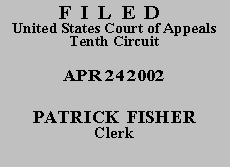

| MANUEL ROBLEADO,
Plaintiff - Appellant, v. DEFFENBAUGH INDUSTRIES, INC., Defendant - Appellee. |
|
This appeal is taken from the district court's Memorandum and Order granting summary judgment in favor of defendant on plaintiff's claims of employment discrimination and retaliation. See Robleado v. Deffenbaugh Indus., Inc., 136 F. Supp. 2d 1179 (D. Kan. 2001). The underlying facts are outlined in the district court's thorough and detailed opinion. The court followed the familiar burden-shifting format of McDonnell Douglas Corp. v. Green, 411 U.S. 792 (1973), in determining that defendant's reasons for not promoting plaintiff were not pretextual and that plaintiff had failed to establish his claim of retaliation. Concluding that plaintiff had failed to establish a genuine issue of material fact as to whether he had been denied promotions because of his age or race or had been retaliated against by defendant, the court granted summary judgment. Robleado, 136 F. Supp. 2d at 1192.
On appeal to this court, plaintiff claims the district court erred in holding that he had failed to establish a genuine issue of material fact on his race discrimination claim, that he had not engaged in protected activity in using the word "discrimination" when complaining to his supervisors, that he had not suffered adverse action by virtue of "numerous written entries placed in his file," and that he could not demonstrate pretext even if he had engaged in protected activity. Aplt. Br. at 2.
We review the district court's grant of summary judgment de novo. See Munoz v. St. Mary-Corwin Hosp., 221 F.3d 1160, 1164 (10th Cir. 2000). In this case, however, we are unable to properly conduct that review because of an inadequate record.
In support of his arguments on appeal, plaintiff has furnished an appendix as required by the Federal Rules of Appellate Procedure and this court's local rules. See Fed. R. App. P. 30; 10th Cir. R. 30.130.3. According to the index, plaintiff's appendix consists of the first amended complaint, defendant's answer, the district court's decision and judgment, and the notice of appeal. The appendix in fact also includes defendant's motion for summary judgment.
In his brief, plaintiff makes numerous references to various other documents, primarily depositions and affidavits, which he did not include in the appendix. "When the party asserting an issue fails to provide a record sufficient for considering that issue, the court may decline to consider it." 10th Cir. R. 10.3(B); see also 10th Cir. R. 30.1(A)(1) ("The appellant must file an appendix sufficient for considering and deciding the issues on appeal.").
Nor does the fortuity of defendant's inclusion in its supplemental appendix of some of the materials cited by plaintiff remedy the review problem we have encountered. First, trying to match internal document page numbers cited by plaintiff with the supplemental appendix numbers used by defendant is an exercise we have no duty to undertake. See 10th Cir. R. 30.1(A)(3) ("The court need not remedy any failure of counsel to provide an adequate appendix."). "It is not this court's burden to hunt down the pertinent materials." Rios v. Bigler, 67 F.3d 1543, 1553 (10th Cir. 1995). Second, in a number of instances only part of the relevant citation provided by plaintiff is included in the supplemental appendix. Finally, as to at least one reference, "Robleado had not even been asked to drive a truck in the last two years," Aplt. Br. at 17, the language in the accompanying page citation does not support the statement in plaintiff's brief. See Aplee. Supp. App. at 14-15.
It is the responsibility of the appellant to supply materials sufficient for this court's consideration and determination of the issues on appeal, whether in a record or in the appendix. See Morrison Knudsen Corp. v. Fireman's Fund Ins. Co., 175 F.3d 1221, 1237-38 n.15 (10th Cir. 1999); see also Rios, 67 F.3d at 1553. The lack of a required record leaves us with no alternative but to affirm. Morrison Knudsen Corp., 175 F.3d at 1238. See also Knowlton v. Teltrust Phones, Inc., 189 F.3d 1177, 1182 (10th Cir. 1999) (party's failure to provide adequate record on appeal renders review of issues impossible, requiring this court to disregard those particular challenges).
Under the circumstances, with an insufficient record to permit review, we must affirm. See Scott v. Hern, 216 F.3d 897, 912 (10th Cir. 2000). Considering the materials provided to us by plaintiff, we cannot conclude that the district court erred in granting summary judgment for defendant.
The judgment of the United States District Court for the District of Kansas is AFFIRMED.
Entered for the Court
Circuit Judge
*. This order and judgment is not binding precedent, except under the doctrines of law of the case, res judicata, and collateral estoppel. The court generally disfavors the citation of orders and judgments; nevertheless, an order and judgment may be cited under the terms and conditions of 10th Cir. R. 36.3.